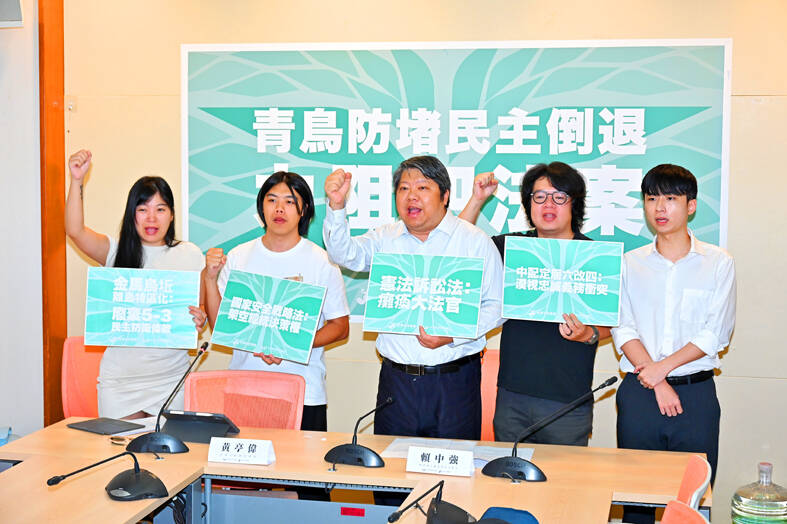Taiwan must reject four bills backed by the Chinese Nationalist Party (KMT) and Taiwan People’s Party (TPP) to prevent democratic backsliding, Bluebird movement activists told a news conference in Taipei yesterday.
The bills are a proposed amendment to the Constitutional Court Procedure Act (憲法訴訟法), a national security strategy draft act and two amendments to the Act Governing Relations Between the People of the Taiwan Area and the Mainland Area (臺灣地區與大陸地區人民關係條例).
The Constitutional Court Procedure Act amendment would change the court’s quorum from two-thirds of presently incumbent justices to two-thirds of the full court, Economic Democracy Union convenor Lai Chung-chiang (賴中強) said.

Photo: Tu Chien-jung, Taipei Times
The court currently consists of 15 grand justices, including seven who are due to retire at the end of October, leaving eight judges sitting on the bench, short of the 10-member threshold stipulated by the amendment, he said.
This means that the KMT and TPP could paralyze the court by refusing to confirm new justices, effectively giving the opposition free reign to pass any law it wishes, Lai said.
The KMT-backed national security strategy bill would empower the premier to draft national security strategy plans, which would be approved by the president and then handed to the legislature for deliberation, he said.
This draft act is an attempt by the legislature to take over the president’s constitutional authority over national security matters, Lai said, adding that bill contravenes the Constitution’s division of powers.
A proposal by opposition lawmakers to shorten the residency requirement for Chinese spouses from six years to four years uses equality as a pretext to give Chinese preferential treatment, Taiwan Citizen Front member Huang Ting-wei (黃亭偉) said.
Non-Chinese foreigners married to Taiwanese face additional hurdles toward obtaining alien residency certificates, including giving up their citizenship of origin and being required to reside in Taiwan for a fixed term without household registration, she said.
Chinese spouses — who already are exempt from these requirements despite being citizens of a hostile state — would have an even shorter path to legal residency, Huang said.
The opposition also proposed to hand the power to establish restricted maritime zones from the military to the Ocean Affairs Council and allow secret cross-strait negotiations to be conducted on the nation’s outlying islands, she said.

Palauan President Surangel Whipps Jr arrived in Taiwan last night to kick off his first visit to the country since beginning his second term earlier this year. After arriving at Taoyuan International Airport at around 6:30 pm, Whipps and his delegation were welcomed by Minister of Foreign Affairs Lin Chia-lung (林佳龍). Speaking to gathered media, the Palauan leader said he was excited and honored to be back in Taiwan on his first state visit to Taiwan since he was sworn in this January. Among those traveling with Whipps is Minister of State Gustav N. Aitaro, Public Infrastructure

President William Lai (賴清德) yesterday thanked Palau for its continued support of Taiwan's international participation, as Taipei was once again excluded from the World Health Assembly (WHA) currently taking place in Switzerland. "Palau has never stopped voicing support for Taiwan" in the UN General Assembly, the WHO and other UN-affiliated agencies, Lai said during a bilateral meeting with visiting Palau President Surangel Whipps Jr. "We have been profoundly touched by these endorsements," Lai said, praising the Pacific island nation's firm support as "courageous." Lai's remarks came as Taiwan was excluded for the ninth consecutive year from the WHA, which is being held in

RESOLUTIONS DEBATE: Taiwan’s allies said that UN and WHA resolutions cited by China and other nations ‘do not determine Taiwan’s participation in WHO activities’ A proposal to invite Taiwan to this year’s World Health Assembly (WHA) was rejected on Monday, resulting in Taipei’s absence from the annual meeting for a ninth consecutive year, although partners spoke up for Taiwan’s participation at the first day of the meeting. The first agenda item after the opening was a “two-on-two debate” on a proposal to invite Taiwan to participate at the WHA as an observer. Similar to previous years, two countries made statements in favor of the proposal, while two others expressed their opposition. Philippine Secretary of Health Teodoro Herbosa, president of the 78th WHA, accepted the WHA General Committee’s

At least three people died and more than a dozen were injured yesterday afternoon when a vehicle struck a group of pedestrians in New Taipei City’s Sansia District (三峽). The incident happened at about 4pm when a car rammed into pedestrians at an intersection near Bei Da Elementary School. Witnesses said the sedan, being driven at a high speed, ran a red light, knocking scooters out of the way and hitting students crossing the road before careening into a median near the intersection of Guocheng and Guoguang streets. The incident resulted in three deaths and 13 injuries, including the driver, a 78-year-old man